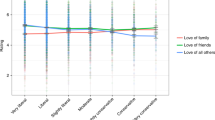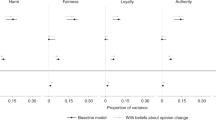Abstract
The presidency of Donald Trump represented a relatively unique event in modern American history, whereby a sitting US president made numerous controversial remarks about minoritized groups yet nonetheless maintained substantial public support. Trump’s comments constituted a departure from the egalitarian norms that had long characterized American political discourse. Here, we examine the potential effects of Trump’s rhetoric on Americans’ attitudes, predicting that these high-profile norm violations may have reshaped the personal prejudices of the American people. In 13 studies including over 10,000 participants, we tested how Americans’ prejudice changed following the political ascension of Donald Trump. We found that explicit racial and religious prejudice significantly increased amongst Trump’s supporters, whereas individuals opposed to Trump exhibited decreases in prejudice. Further, changing social norms appear to explain these changes in prejudice. These results suggest that Trump’s presidency coincided with a substantial change in the topography of prejudice in the United States.
This is a preview of subscription content, access via your institution
Access options
Access Nature and 54 other Nature Portfolio journals
Get Nature+, our best-value online-access subscription
$29.99 / 30 days
cancel any time
Subscribe to this journal
Receive 12 digital issues and online access to articles
$119.00 per year
only $9.92 per issue
Buy this article
- Purchase on Springer Link
- Instant access to full article PDF
Prices may be subject to local taxes which are calculated during checkout




Similar content being viewed by others
Data availability
All data, materials and pre-registration documentation are available on the Open Science Framework at https://osf.io/9syz8/. Source data are provided with this paper.
Code availability
All analysis code is available on the Open Science Framework at https://osf.io/9syz8/.
References
Bobo, L. D. & Charles, C. Z. Race in the American mind: from the Moynihan report to the Obama candidacy. Ann. Am. Acad. Polit. Soc. Sci. 621, 243–259 (2009).
Bobo L. D., Charles C. Z., Krysan M., Simmons A. D. & Fredrickson G. M. in Social Trends in American Life: Findings from the General Social Survey since 1972 (ed. Marsden, P.) 38–83 (Princeton Univ. Press, 2012).
Dovidio, J. F. & Gaertner, S. L. Aversive racism. Adv. Exp. Soc. Psychol. 36, 4–56 (2004).
Dovidio J. F. & Gaertner S. L. in Handbook of Social Psychology (eds Fiske, S. T. et al.) 1084–1121 (Wiley, 2010).
Schuman, H., Steeh, C., Bobo, L. D. & Kysan, M. Racial Attitudes in America: Trends and Interpretations (Harvard Univ. Press, 1997).
Mutz, D. C. Status threat, not economic hardship, explains the 2016 presidential vote. Proc. Natl Acad. Sci. USA 201718155 (2018).
Tesler, M. Economic anxiety isn’t driving racial resentment. Racial resentment is driving economic anxiety. The Washington Post (22 August 2016).
Schaffner, B. F., MacWilliams, M. & Nteta, T. Understanding white polarization in the 2016 vote for president: the sobering role of racism and sexism. Polit. Sci. Q. 133, 9–34 (2018).
Hate Crime Statistics 2016. Federal Bureau of Investigation https://ucr.fbi.gov/hate-crime/2016/topic-pages/incidentsandoffenses (2017).
O’Reilly, A. Hate crimes in US on the rise. Fox News (15 August 2017).
Thrush, G. & Haberman, M. Trump gives White supremacists an unequivocal boost. The New York Times (15 August 2017).
U.S. Muslims concerned about their place in society, but continue to believe in the American dream. Pew Research Center https://www.pewforum.org/2017/07/26/findings-from-pew-research-centers-2017-survey-of-us-muslims/ (2017).
Ritter, Z. & Tsabutashvili, D. Hispanics’ emotional well-being during the Trump era. Gallup (10 August 2017).
BBC. ‘Trump effect’ led to hate crime surge, report finds. BBC (29 November 2017).
Crandall, C. S., Miller, J. M. & White, M. H. Changing norms following the 2016 US presidential election: the Trump effect on prejudice. Soc. Psychol. Personal. Sci. 9, 186–192 (2018).
Williamson, V. & Gelfand, I. Trump and racism: what do the data say? Brookings https://www.brookings.edu/blog/fixgov/2019/08/14/trump-and-racism-what-do-the-data-say/ (2019).
Abernathy, G. Trump is not a racist. His voters aren’t either. The Washington Post (7 August 2019).
Green, E. How much discrimination do Muslims face in America? The Atlantic (26 July 2017).
Nash, C. CAIR releases app for reporting ‘hate crimes,’ ‘bias incidents.’ Breitbart (26 June 2017).
Wendling, M. US election 2016: are hate crimes spiking after Trump’s victory? BBC (11 November 2016).
Chait, J. Donald Trump, White supremacy, and the discourse of panic. New York Magazine (24 September 2017).
Hunt, A. R. No, Republicans, not everyone incites violence. Bloomberg News (29 October 2018).
Kuttner, R. Steve Bannon, unrepentant. The American Prospect (16 August 2017).
Hopkins, D. J. & Washington, S. The rise of Trump, the fall of prejudice? Tracking white Americans’ racial attitudes via a panel survey, 2008–2018. Public Opin. Q. 84, 119–140 (2020).
Sides, J., Tesler, M. & Vavreck, L. Identity Crisis (Princeton Univ. Press, 2018).
Schaffner, B. F. The Acceptance and Expression of Prejudice during the Trump Era (Cambridge Univ. Press, 2020).
Hopkins, D. White Americans say they’re less prejudiced. FiveThirtyEight (23 July 2019).
López, I. H. Why do Trump’s supporters deny the racism that seems so evident to Democrats? Los Angeles Times (13 August 2019).
Tankard, M. E. & Paluck, E. L. Norm perception as a vehicle for social change. Soc. Issues Policy Rev. 10, 181 (2016).
Tankard, M. E. & Paluck, E. L. The effect of a Supreme Court decision regarding gay marriage on social norms and personal attitudes. Psychol. Sci. 28, 1334–1344 (2017).
Terry, D. J. & Hogg, M. A. Group norms and the attitude–behavior relationship: a role for group identification. Pers. Soc. Psychol. Bull. 22, 776–793 (1996).
Sherif, M. & Sherif, C. W. Reference Groups (Harper & Row, 1964).
Desjardins, L. Every moment in Trump’s charged relationship with race. PBS News Hour (22 August 2017).
Leonhardt, D. & Philbrick, I. P. Donald Trump’s racism: the definitive list. The New York Times (15 January 2018).
Mendelberg, T. The Race Card: Campaign Strategy, Implicit Messages, and the Norm of Equality (Princeton Univ. Press, 2001).
Cialdini, R. B. & Goldstein, N. J. Social influence: compliance and conformity. Annu. Rev. Psychol. 55, 591–621 (2004).
Sechrist, G. B. & Stangor, C. in Social Psychology of Prejudice: Historical and Contemporary Issues (eds Crandall, C. S. & Schaller, M.) (Lewinian, 2005).
Ofosu, E. K., Chambers, M. K., Chen, J. M. & Hehman, E. Same-sex marriage legalization associated with reduced implicit and explicit antigay bias. Proc. Natl Acad. Sci. USA 116, 8846–8851 (2019).
Schmidt, K. & Axt, J. R. Implicit and explicit attitudes toward African Americans and Barack Obama did not substantively change during Obama’s presidency. Soc. Cog. 34, 559–588 (2016).
Schmidt, K. & Nosek, B. A. Implicit (and explicit) racial attitudes barely changed during Barack Obama’s presidential campaign and early presidency. J. Exper. Soc. Psychol. 46, 308–314 (2010).
Imhoff, R. & Recker, J. Differentiating Islamophobia: introducing a new scale to measure Islamoprejudice and secular Islam critique. Polit. Psychol. 33, 811–824 (2012).
Kteily, N., Bruneau, E., Waytz, A. & Cotterill, S. The ascent of man: theoretical and empirical evidence for blatant dehumanization. J. Pers. Soc. Psychol. 109, 901–931 (2015).
Henry, P. J. & Sears, D. O. The symbolic racism 2000 scale. Polit. Psychol. 23, 253–283 (2002).
Brigham, J. C. College students’ racial attitudes. J. Appl. Soc. Psychol. 23, 1933–1967 (1993).
Pew Research Center. Most Americans say Trump’s election has led to worse race relations in the U.S. https://www.pewresearch.org/politics/2017/12/19/most-americans-say-trumps-election-has-led-to-worse-race-relations-in-the-u-s/ (2017).
Buhrmester, M., Kwang, T. & Gosling, S. D. Amazon’s Mechanical Turk: a new source of inexpensive, yet high-quality, data? Persp. Psychol. Sci. 6, 3 (2011).
Plant, E. A. & Devine, P. G. Internal and external motivation to respond without prejudice. J. Pers. Soc. Psychol. 75, 811 (1998).
Greenwald, A. G., McGhee, D. E. & Schwartz, J. L. Measuring individual differences in implicit cognition: the implicit association test. J. Pers. Soc. Psychol. 74, 1464–1480 (1998).
Devos, T. & Banaji, M. R. American = white? J. Pers. Soc. Psychol. 88, 447 (2005).
Paolacci, G. & Chandler, J. Inside the Turk: understanding Mechanical Turk as a participant pool. Curr. Dir. Psychol. Sci. 23, 184 (2014).
Stewart, N. et al. The average laboratory samples a population of 7,300 Amazon Mechanical Turk workers. Judg. Dec. Making 10, 479 (2015).
Zhou, H. & Fishbach, A. The pitfall of experimenting on the web: how unattended selective attrition leads to surprising (yet false) research conclusions. J. Pers. Soc. Psychol. 111, 493 (2016).
Braver, S. L., Thoemmes, F. J. & Rosenthal, R. Continuously cumulating meta-analysis and replicability. Persp. Psychol. Sci. 9, 333 (2014).
McShane, B. B. & Böckenholt, U. Single-paper meta-analysis: benefits for study summary, theory testing, and replicability. J. Consum. Res. 43, 1048–1063 (2017).
Hedges, L. V. & Vevea, J. L. Fixed-and random-effects models in meta-analysis. Psychol. Meth. 3, 486–504 (1998).
Konstantopoulos, S. Fixed effects and variance components estimation in three-level meta-analysis. Res. Synth. Meth. 2, 61–76 (2011).
Litman, L., Robinson, J. & Abberbock, T. TurkPrime.com: a versatile crowdsourcing data acquisition platform for the behavioral sciences. Behav. Res. Meth. 49, 433 (2017).
Acknowledgements
This research was supported by a NSF Graduate Research Fellowship (grant no. 1144153) and European Commission Marie Skłodowska-Curie Fellowship (grant no. 897440) to B.C.R. The funders had no role in study design, data collection and analysis, decision to publish or preparation of the manuscript.
Author information
Authors and Affiliations
Contributions
B.C.R. and M.J.F. conceived of the idea and planned the experiments. B.C.R. designed and programmed the experiments and analysed the data. B.C.R. and M.J.F. wrote the manuscript.
Corresponding author
Ethics declarations
Competing interests
The authors declare no competing interests.
Peer review
Peer review information
Nature Human Behaviour thanks Stacey Sinclair and the other, anonymous, reviewer(s) for their contribution to the peer review of this work.
Additional information
Publisher’s note Springer Nature remains neutral with regard to jurisdictional claims in published maps and institutional affiliations.
Supplementary information
Supplementary Information
Supplementary materials, analyses, text, Figs. 1 and 2 and Tables 1–14.
Supplementary Data 1
Statistical source data for Supplementary Fig. 1.
Supplementary Data 2
Statistical source data for Supplementary Fig. 2.
Source data
Source Data Fig. 1
Statistical source data for Fig. 1.
Source Data Fig. 2
Statistical source data for Fig. 2.
Source Data Fig. 3
Statistical source data for Fig. 3.
Source Data Fig. 4
Statistical source data for Fig. 4
Rights and permissions
About this article
Cite this article
Ruisch, B.C., Ferguson, M.J. Changes in Americans’ prejudices during the presidency of Donald Trump. Nat Hum Behav 6, 656–665 (2022). https://doi.org/10.1038/s41562-021-01287-2
Received:
Accepted:
Published:
Issue Date:
DOI: https://doi.org/10.1038/s41562-021-01287-2
This article is cited by
-
Ideological asymmetries in online hostility, intimidation, obscenity, and prejudice
Scientific Reports (2023)
-
The Influence of Social Norms on the Expression of Anti-Black Bias
Journal of Business and Psychology (2023)
-
Should police officers who use force against peaceful protesters be punished? A national experiment
Journal of Experimental Criminology (2023)



